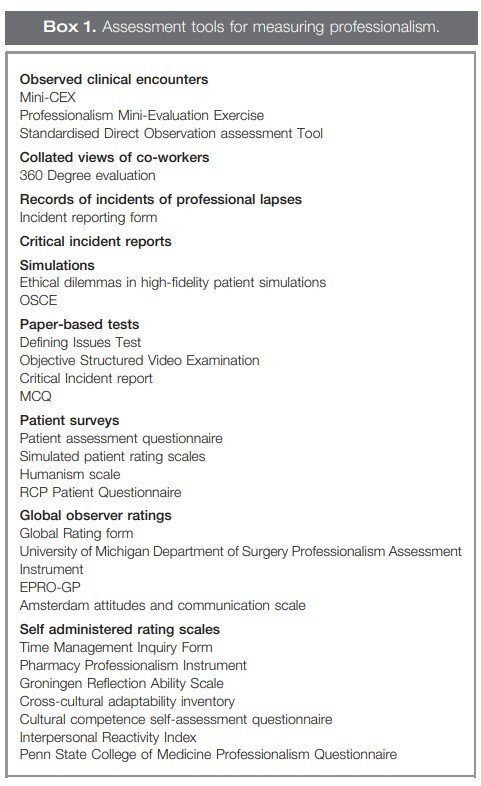How to assess professionalism?
There is an increased interest in measuring professionalism in health professional education. Assessing professionalism should be done longitudinally, through different methods, and across different contexts. Professionalism is a complex phenomenon and cannot be assessed accurately in a single action at a single point in time.

The assessment of professionalism is an evolving field!
The academic literature on the assessment of professionalism has moved from an initial focus on the development and attainment of professional identity (through identifying areas of deficiency, such as the loss of ethical principles) to the attainment of a set of identifiable positive attributes and behaviors. It is now beginning to recognize the challenge of assessing a multi-dimensional construct and the need to embrace a diversity of approaches.
There are nine clusters of assessment tools for measuring professionalism. Box 1 lists the different clusters with examples of assessment tools in each category. Many of the instruments used have not been fully tested in terms of their reliability and validity.

“The evaluation of professionalism can be viewed from three different yet complementary perspectives: the individual, the relational, and the organizational.”
Hodges 2011
Brian Hodges is a Professor in the Faculty of Medicine and Executive-Vice President, Education and Chief Medical Officer at the University Health Network in Toronto. He is a practicing psychiatrist and teacher and a member of the KIPRIME prize committee.
References and related material
- Goldie, J. (2012). Assessment of professionalism: A consolidation of current thinking. Medical Teacher, 35(2), e952-e956. https://doi.org/10.3109/0142159x.2012.714888
- Burford, B., Morrow, G., Rothwell, C., Carter, M., & Illing, J. (2014). Professionalism education should reflect reality: findings from three health professions. Medical Education, 48(4), 361-374. https://doi.org/10.1111/medu.12368
- Hodges, B., Paul, R., Ginsburg, S., & the Ottawa Consensus Group Members. (2019). Assessment of professionalism: From where have we come – to where are we going? An update from the Ottawa Consensus Group on the assessment of professionalism. Medical Teacher, 41(3), 249-255. https://doi.org/10.1080/0142159x.2018.1543862
- van Mook, W. N., van Luijk, S. J., O’Sullivan, H., Wass, V., Schuwirth, L. W., & van der Vleuten, C. P. (2009). General considerations regarding assessment of professional behaviour. European Journal of Internal Medicine, 20(4), e90-e95. https://doi.org/10.1016/j.ejim.2008.11.011
